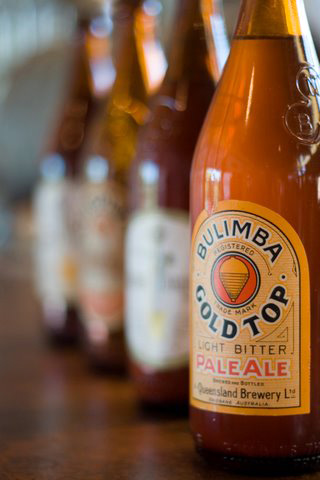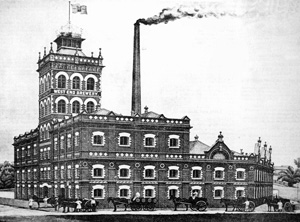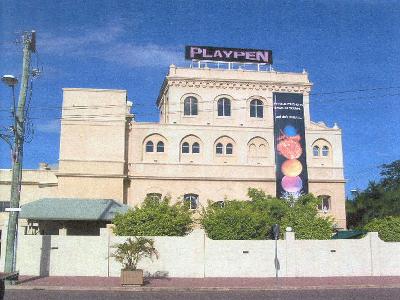
Brewing or suing: the litigious Lanfears
It is easy these days to forget that once every major Australian city had several breweries and most regional towns at least one. In Queensland, as in the other Australian colonies, the development of the brewing industry was directly stimulated by mining—especially for gold—and by the construction of the railway network. In this extract from his forthcoming book Beer, Mines and Rails: a history of the brewing industry in Queensland to the 1920s Australia’s leading beer historian, Dr Brett Stubbs, looks at the contribution one family made to brewing in Queensland and beyond.
Although not nearly as well known as the brothers Patrick and Thomas Perkins, the much-publicised founders of the Perkins breweries in Toowoomba and Brisbane, the Lanfear brothers, to my mind, are at least as interesting. These three men were closely involved with many early Queensland breweries, and played significant roles in the development of the industry in that State. At least two of the three were uncommonly litigious, and records of the various court cases in which they were involved provide much of our knowledge of their brewing careers in Queensland.
The Lanfear brothers, Thomas Albert, Walter Edward, and Charles Ernest were all born in London, England. Thomas Albert (known as Albert) came to Australia in 1878 to work for his uncle, Albert Duncombe Terry, who owned the West End Brewery in Flinders Street, Melbourne. Walter also worked at the West End Brewery in Melbourne, having come to Australia a couple of years after Albert.
Walter Edward Lanfear (c.1861–1913) was the first of the brothers to move to Queensland. He became the inaugural brewer for Queensland Brewing Company Limited when that company opened its Bulimba Brewery in Brisbane in 1883. Walter severed his engagement early in 1885 because of illness, then left to spend some time in England furthering his studies. He was succeeded at the brewery by his elder brother, Albert, also of the West End Brewery, Melbourne. Albert left the Bulimba Brewery the following year to start a new brewery at South Brisbane—the West End, named after his uncle’s establishment in Melbourne.
Thomas Albert Lanfear (1857–1924) teamed with George Bruce Nicol, a Queenslander of Scottish descent, in establishing the West End Brewery in Brisbane. This brewery, erected at the corner of Merivale and Montague Streets, South Brisbane, began working in September 1886, with Albert as the brewing partner. The site of the brewery is close to the present Lanfear Street in that part of South Brisbane known today as West End, after the brewery.
After surviving the depression of the early 1890s, and a major flood in 1893, the West End Brewery was beset in 1895 by infection problems. The directors responded by dismissing the brewer. It transpired, however, that the source of the problem was a defective and germ-harbouring wooden floor, not an incompetent brewer and the trouble was eliminated when a new floor was eventually constructed.
The brewer in question was Charles Lanfear, younger brother of the founding brewer, Albert Lanfear. Charles Ernest Lanfear (c.1867–1953) had learnt brewing in Buckinghamshire, England, and after a thorough training studied brewing chemistry at London University under Professor Charles Graham. From the university he went to a brewery in Shropshire, and while there he was engaged to come to Australia. He did so in 1890, entering the West End Brewery in Brisbane as assistant to his brother. He was appointed as brewer at the end of 1893 when Albert left to start another brewery at Townsville. After his dismissal from the West End Brewery, Charles took up a brewing position with McLaughlin and Co. at the Fitzroy Brewery, Rockhampton. He also launched a legal action against his former employer for wrongful dismissal and succeeded in having his salary paid to the end of his term of engagement, namely, to the end of 1895.
During a visit to England in 1896, Lanfear discovered that a letter had been written by West End Brewery to its London shareholders attributing financial losses in 1895–96 to his negligence and incompetence. Lanfear brought an action against the company for libel. Although judgement was ultimately in favour of the company, the lengthy Supreme Court hearings in Brisbane in mid-1898 tended to uphold his reputation as a competent brewer.
In 1897, after his trip to England, Lanfear left McLaughlin and Co. and was appointed to the charge of the Kent Brewery, also in Rockhampton. In the first half of 1901, he resigned from the Kent Brewery, moving to Charleville where he had taken the brewery there. The arrangement was that Lanfear would take the brewery for twelve months without rental, and at the end of that time he had the option of leasing it, and had the right of purchase. He continued brewing until early 1902, when a shortage of water in the brewery’s well forced him to close the operation. He moved to Maryborough, to take the position of brewer to Louis Steindl. He also brought legal action against Albert Aeschimann, the owner of the Charleville brewery, for false representation. Lanfear alleged that Aeschimann had told him that the well was ‘inexhaustible’, knowing this to be false, and with the intention of inducing him to take the lease. The case was decided in the Supreme Court in Brisbane in May 1903 in favour of Aeschimann. Charles Lanfear later returned to live in England, where he died in 1953.
In the meantime, Walter Lanfear had returned from his short trip to England, and late in 1885 he became brewer for the Gympie Brewing Company. Walter left Gympie in mid-1887, and the following year he teamed with John Ferry Nicol in establishing the Phoenix Brewery in Fortitude Valley, Brisbane. The business of the Phoenix Brewery was dissolved early in 1893, after it had sustained heavy damage when the Brisbane River flooded in February that year. After the closure of the brewery, its assets were sold to Castlemaine Brewery and Quinlan, Gray and Co. Limited, who also engaged the services of Lanfear. Castlemaine had acquired Phoenix primarily to secure its substantial north Queensland trade, and Lanfear was engaged to brew for that trade for twelve months. It was stated at the annual meeting of the Castlemaine company in 1894 that Lanfear brewed ‘bad beer’, and his services had to be dispensed with, after which their own brewer took over. Lanfear sued the Castlemaine Brewery for defamation, with unknown result.
At the beginning of 1894, Walter Lanfear joined the staff of the Towers Brewery, Charters Towers, taking charge of brewing operations. He didn’t stay there for long; in March 1894 he was sacked, along with other employees, as the brewery was in financial trouble. Lanfear initiated successful legal proceedings against the Towers Brewery Co. for breach of agreement, and damages for wrongful dismissal.
In 1895, Walter returned to Gympie to take over the management of the brewery for which he had worked briefly several years before. In 1898 a group of Gympie publicans launched the Licensed Victuallers’ Brewing Company and built a second brewery at Gympie, and Walter resigned and went to work for this new firm. The successful contractor for the supply and erection of the new brewery was the Brisbane firm of mechanical engineers, Clark and Fauset. Lanfear later sued Thomas Fauset for a commission, claimed to have been earned as Fauset’s agent in securing for him the brewery contract. The case was tried in the Supreme Court in August 1899 before the Chief Justice, Sir Samuel Griffith, with counsel engaged on both sides. The Chief Justice decided that as the plaintiff was an employee of the brewing company, his claim for a commission was dishonest and could not be maintained. Lanfear was therefore non-suited with costs.
Lanfear returned to the other Gympie brewery as brewer and manager in 1900. When it closed in 1903, he moved to Western Australia, where he worked first at the Bunbury Brewery and later the Stanley Brewery, Perth, then Hannan’s Brewery, Kalgoorlie. He had been adjudged insolvent in June 1902, citing a general depression in trade, pressure of a single creditor, and losses in mining speculations as causes. In addition, Lanfear was still suffering from losses incurred in Brisbane in 1893 when his Phoenix Brewery was damaged by floodwater. He died at Bunbury, Western Australia, in 1913.
Albert Lanfear left the West End Brewery in Brisbane at the end of 1893 to found a new brewery in Townsville. This was the Lion Brewery, in which his partner was Samuel Nesbitt Allen, also the managing director of Samuel Allen and Sons Limited, a well known firm of general merchants. At the time of Lanfear’s departure from Brisbane, the West End Brewery was doing a substantial trade in the northern portion of the colony. Samuel Allen and Sons was the northern agent for West End, and it was through this brewer-agent relationship that the new brewing firm of Allen and Lanfear arose. The Lion Brewery was erected in Flinders Street, almost opposite the Townsville railway station, and the first brew of Lion XXX Beer went on sale in October 1894. Walter Lanfear, Albert’s brother, and recently brewer at Charters Towers, acted as agent in Brisbane for the Lion Brewery.
In 1898, the Lion Brewery at Townsville and the Towers Brewery at Charters Towers were amalgamated as Northern Breweries (Queensland) Limited. Albert Lanfear did the brewing at both the Townsville and the Charters Towers breweries, making periodic trips from one to the other for that purpose. The Lion Brewery was closed in 1908, after which Lanfear continued as manager and brewer at the Towers Brewery. He remained in that position until his death in 1924.
Altogether the three Lanfear brothers were involved with no fewer than thirteen Queensland breweries from the early 1880s until the 1920s, including the large West End and Lion breweries of which Albert was co-founder. Their careers also spanned other Australian colonies and included English breweries.
Extract from Beer, Mines and Rails: a history of the brewing industry in Queensland to the 1920s by Dr Brett J. Stubbs to be published later this year by Tankard Books (www.tankardbooks.com.au).
[adrotate group=”1″]







